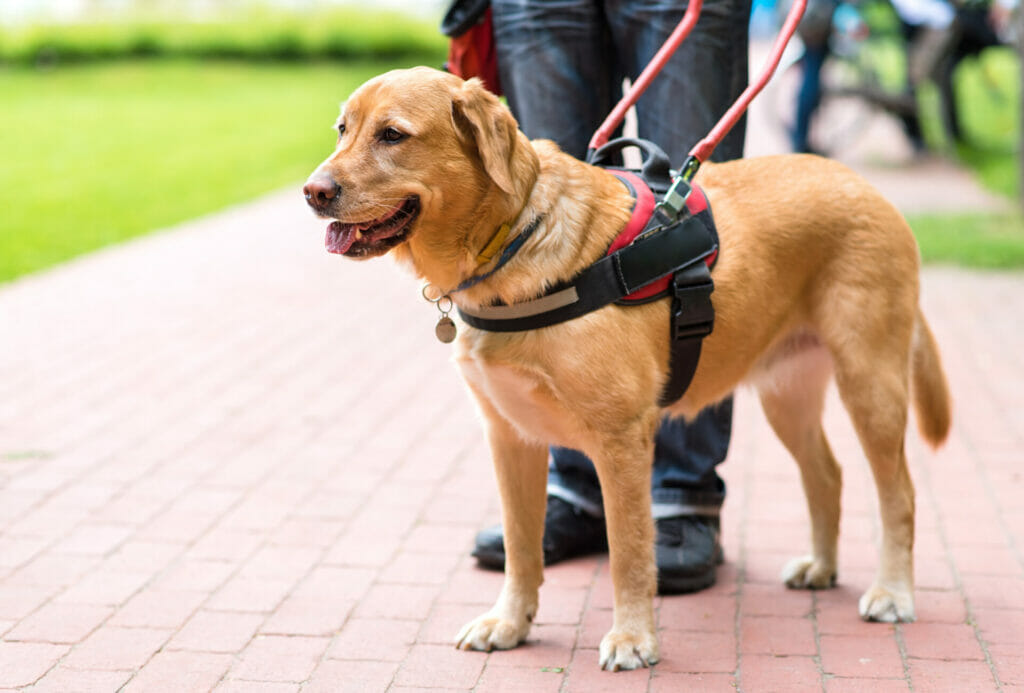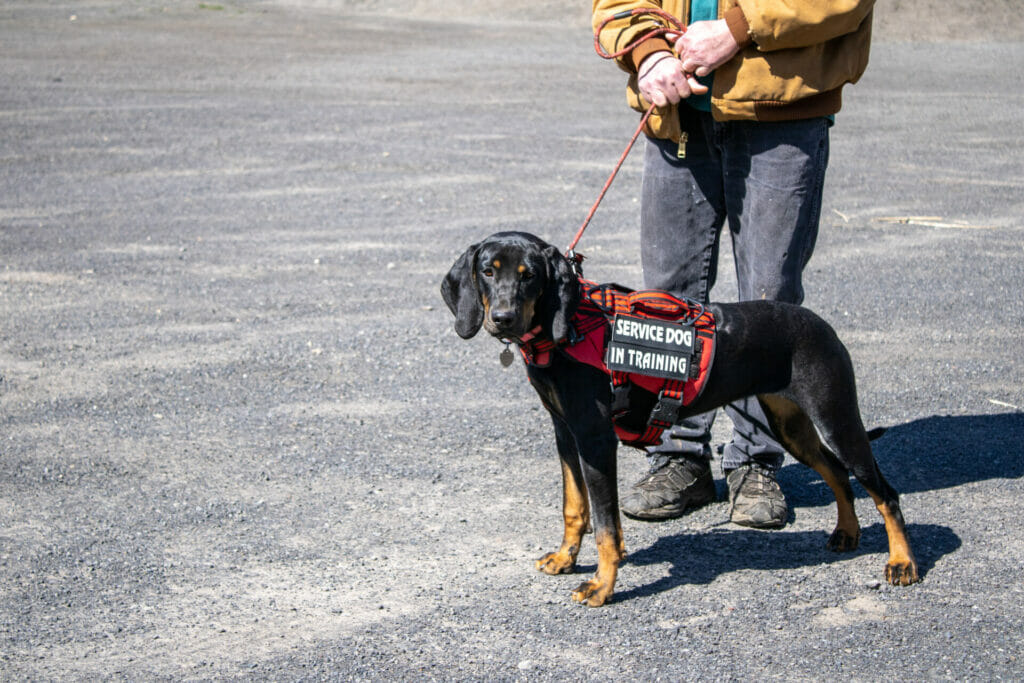One treatment modality that can be helpful for some adults and children with Autism or Autism Spectrum conditions is working with therapy dogs at school or in therapy or having their own specially trained service dog. Some Autistic individuals may have challenges with communication, struggle socially, and can have obsessive interests or routines. Some people with autism spectrum disorders may also struggle with anxiety, stress, or cognitive delays. For some children and adults, working with a service dog can help to mitigate conditions and support autistic people to be more independent.
What is a Service Dog?
Service dogs are specially trained dogs who perform tasks to mitigate an individual’s disability. When partnered with an adult or child with autism, service dogs can be trained to do various tasks depending on the autistic person’s needs. Tasks commonly taught to autism service dogs include deep pressure therapy (DPT), which can support calming and emotional regulation. Service dogs can also be taught to interrupt self-harming or repetitive movements and disrupt panic attacks. Other common skills taught to service dogs working with autistic people include crowd control and navigation to help their handler to better and more comfortably be able to navigate public spaces. Service dogs are specifically trained not only to perform tasks that mitigate an individual’s disability, but these dogs are also specially trained in public access skills which gives them the skills to work alongside their handler in public places, including stores, restaurants, and airplanes where dogs are not normally allowed. Service dogs are taught not to engage with people other than their handler, not to sniff merchandise, and to ignore any other animals. Suppose an autistic child or individual cannot safely manage their service dog themself. In that case, some service dog trainers and programs will place service dogs that work with the autistic child but where a parent/guardian/caretaker will be physically holding the leash and handling the dog. Properly trained service dogs are protected by the Americans with Disabilities Act and can accompany their handler anywhere in public, including schools and restaurants.
Service dogs, therapy dogs, and emotional support dogs aren’t the same:
What is a therapy dog?
Therapy dogs are calm, empathetic dogs trained and certified to visit public settings like schools, libraries, hospitals, and nursing homes alongside their owner/handler. Some therapists also utilize therapy dogs in their practices. Therapy dogs can be helpful when making connections to Autistic children and adults. These therapy dogs can provide non-judgemental support to individuals and encourage their participation in activities. Even short interactions with therapy dogs can significantly affect help and engagement. Therapy Dogs visit programs and schools with their handlers; they do not have public access rights other than when invited to visit a school, nursing home, etc.

What is an emotional support dog?
An emotional support dog is a pet dog living with a person with disabilities, including autism, whose presence is comforting. Emotional support dogs provide comfort and companionship to a disabled person. For children and adults with autism, an emotional support dog can be an essential part of their comfort and treatment plan. Emotional support dogs do not have any specialized training; rather it is their presence that is helpful to the person with autism. Emotional support dogs do not have any public access rights, meaning they are not able to accompany their owner into any places where dogs are not normally allowed. With a prescription from their doctor for an emotional support dog (or other pet), people with disabilities can have a pet in housing that is not traditionally dog or pet friendly, so long as that emotional support dog is not disruptive to neighbors or destructive to the property. If you think you or your child could benefit from an emotional support dog, discuss this with your doctors, therapists, and other healthcare providers.
How to get an autism service dog
If you are wondering if an autism service dog would be helpful for you or your child, the first step is to talk with your doctor and care team. They will be able to discuss with you if a service dog would be a helpful support and part of a broader treatment plan. Service dogs can be any breed or mixed breed of dog depending on the specific tasks an individual disabled handler needs. Some breeds, like golden retrievers, Labrador retrievers, and standard poodles, are most commonly used, but they are not the only breeds of dogs that do service work. Service dogs can be trained and placed with an individual through a program or trained by an individual trainer alongside their disabled handler. Initial costs for a service dog will depend on what trainer and program you work through, but generally start at $10,000. Keep in mind a service dog is not only an expensive piece of medical equipment, but it is a living, breathing dog who will need ongoing care and continued training for the rest of their life.

Finding a service dog
Some service dog programs will help individuals and families fundraise for dogs. Many programs also have waiting lists and extensive application processes for determining if you’re a good match for an autism service dog. A few programs to look at when beginning your search are:
Canine Companions – A leading service dog training program that raises and trains task-trained service dogs with people who have a variety of disabilities, including Autism.
4 Paws for Ability – A program that trains and places service dogs with children and adults who have disabilities.
NEADS – Provides service dogs to children, teens, and adults with disabilities.
Is a service dog right for every person with autism?
No! A service dog is just one support option, but it will not be the right treatment plan for every autistic person. Some children and adults with autism don’t like dogs, are afraid of dogs, or find aspects of dog ownership or handling frustrating. Some autistic people find dogs overwhelming and unpleasant on a sensory level. Before pursuing a service dog, it’s essential to think critically about an individual’s preferences, but also their needs to determine if there are tasks a trained service dog could do to support them. It’s also important to consider lifestyle and financial resources when considering if the individual, or the individual and their family, can adequately care for a service dog. Not every person with autism needs, wants or could benefit from a service dog.




















